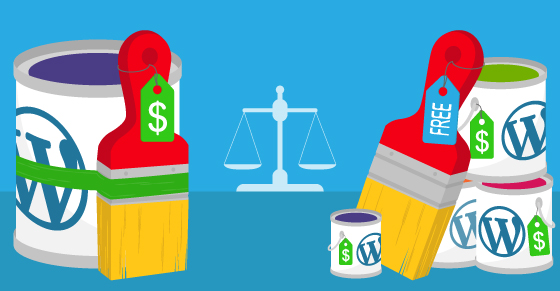|
|
My name is Michael Hebenstreit and I’m the founder & CEO of Array Internet, a media company located in Frankfurt am Main (Germany). With our brand, MH Themes, we’ve been running a profitable WordPress theme business since 2012. While we focus mostly on bloggers and companies that want to start editorial websites, there are many other interesting niches you can create WordPress themes for. In this post, I’ll share some tips and best practices for starting a profitable WordPress theme business in 2018.
The Current State of The Market for WordPress Themes
Selling premium WordPress themes has been a highly lucrative business for years. If you manage to develop beautiful, stable and reliable products, while making sure that providing great customer support won’t be a burden, these businesses can scale very well.
However, when we started our business back in 2012, the market for WordPress themes was much different than it is today. Even at that time, there were already many WordPress themes available, but it was much easier to launch a new theme and make it quite popular by investing efforts in marketing and promotion.
Today the market for WordPress themes is highly competitive and saturated. For all kinds of niches, there are plenty of different WordPress themes available, and many of these themes look similar while also doing the same thing. In addition, there are highly popular multi-purpose themes which can be used for almost anything. These multi-purpose WordPress themes usually are marketed very well and generate a lot of revenue for their developers, especially when looking at the popular multi-purpose themes on marketplaces, like ThemeForest.
Overall, starting a completely new WordPress theme business nowadays can be a tough challenge. You’re not only facing extreme competition and market saturation, but you’re also dealing with a constant race to the bottom, which I’ll explain further down the article. In addition, WordPress has started to evolve while adopting new technologies which is a challenge for developers as well. More on that later.
How to Get Started with Your WordPress Theme Business?
If you want to start a profitable WordPress theme business, the most important thing is having a well-thought-out plan. Simply releasing one WordPress theme after another in order to see what sticks may have worked years ago, but those times are definitely over. Nowadays it’s very important to focus on a particular niche and then create the best possible product for that target audience.
But how to find a profitable niche? Try to figure out what people are looking for and what niches or even micro niches are lacking professional WordPress themes. You could for example use tools like Google Trends in order to determine what popular keywords people are searching for.

Once you’ve figured out an interesting niche, you can look at the competition in that niche to see if there is potential to launch a better product than what is already available.
Try to figure out what people are looking for and what niches or even micro niches are lacking professional WordPress themes.
If you see potential, then you can start developing your product. Try to figure out what your target audience really needs. For example, you could have a look at support forums to learn about the needs and struggles of users or check real-life websites in that niche and use that information to create a product that meets your customer’s needs. Make sure your product follows best practices and has an up-to-date and modern design in order to make it competitive.
After you’ve created your awesome WordPress theme, have tested it extensively and possibly even gathered insights and feedback from a small group of users, you can start thinking about a plan to market your WordPress theme. You’ll be surprised how much work is involved in marketing your product. Having a great product alone usually won’t sell, you need to tell the world about it and do it right. Marketing mistakes can be very expensive in the long run.
Having a great product alone usually won’t sell, you need to tell the world about it and do it right.
You may be tempted to just upload your WordPress theme to a marketplace and start selling there, possibly even exclusively. From experience, I can tell you that you should think carefully about this step. Selling through a 3rd party marketplace means the customers won’t be yours, you’re dependent on the terms of the marketplace, you usually pay a hefty fee to the marketplace and in addition, you’ll have a lot of competition there. You surely could upload your product to a marketplace, but then only for promotion purposes. It shouldn’t be your business strategy to solely rely on sales from that particular marketplace.
Instead, it would be a much better long-term business strategy to start your own website. In my opinion, this truly is the key to a profitable WordPress theme business and any other online business as well. With your own website you own the customers, you can run your own marketing campaigns, you can optimize your site for relevant keywords to outrank your competition and increase revenue through organic traffic. You basically are in control of your business and you can make decisions that move your business forward.
You can promote your products with your own marketing campaigns, offer a free version with an upgrade path to attract new users, use social media to expand your reach and do whatever you have in mind to increase your revenue. You’re the boss!
The key to a profitable WordPress theme business is building your own brand and not relying on a particular marketplace.
When running your own independent online business, you don’t even necessarily need to take care of invoices, taxes or eCommerce functionality on your site. This sort of stuff can take lots of time, which means unnecessary distraction from your core business. Instead, you could partner with a 3rd party reseller like Freemius. Freemius, as your reliable distribution partner, takes care of the administrative stuff while handling taxes and invoices for you. That means you can fully focus on your business and marketing instead. This truly can make a difference.
What Are The Main Challenges for A WordPress Theme Business?
Ok, you’ve figured out your preferred niche and target audience, you’ve created an awesome product and you’ve got a solid marketing plan. You’ve also created your own website to run and promote your business and you may even have partnered up with a reliable company to handle the administrative stuff for you. However, before you can start a profitable WordPress theme business, there are a few challenges you need to be aware of. Keeping these things in mind will protect your business from false decisions and ensure that you won’t waste your valuable time and money.
In addition to a saturated market environment, there unfortunately also is a race to the bottom. This not only affects WordPress themes but WordPress related businesses in general. While running a WordPress theme business in the United States or in western Europe, you obviously need to price your products at a reasonable level in order to run a profitable business. For WordPress themes, this usually means around $49 – $89 for a single theme license.
Though, there are plenty of developers from developing countries who can price their products much lower due to lower costs in low wage countries. That means you’re also dealing with competitors who are pricing similar products at a fraction of the cost. One way to deal with that is by doing better at marketing and explain to your potential customers why it’s worth buying from you (e.g. by proving reliable support, regular updates, high-quality products, etc…).
However, there also seems to be a trend where large corporations offer subscription services at low cost while offering thousands of digital products as unlimited downloads, turning WordPress themes into a commodity. A recent example is Envato which has started including WordPress products in Envato Elements. This obviously is a much bigger problem. Things like this don’t really help to educate customers that WordPress products are worth paying for and that developers need to be able to make a living from their work.
Grab a free copy of our Cheat Sheet for
Selling Plugins and Themes
A growth roadmap with concise, actionable tips for every milestone of WordPress product development.

But there is another challenge. In addition to a saturated and competitive market environment and an ongoing race to the bottom, there currently also is much uncertainty amongst developers. This is related to recent decisions that involve the future of WordPress.
The Future of WordPress
WordPress currently is the most popular content management system, powering around 29% of the internet. Some people would argue otherwise, but in my opinion, the main reason for this growth has been the low entry barrier for developers, the huge ecosystem of WordPress themes, plugins, hosting services and the thousands of agencies and consultants worldwide who recommend WordPress to their clients. However, we’re currently at a point where the future of WordPress is uncertain.
You may have heard already about the Gutenberg project. Gutenberg was announced by WordPress core developers, led by Automattic, to replace the current WordPress editor. While I think that this truly is a very good idea, since the editor could use an overhaul after several years, Gutenberg now turns out to become a complete rewrite of WordPress, step by step. This obviously involves many challenges related to backwards compatibility and controversial discussions about the future of WordPress.

Anyway, what does this have to do with running a profitable theme business? The current situation is highly unsatisfactory for developers and businesses in the WordPress ecosystem. The information on the roadmap of Gutenberg is vague and there is inconsistent communication. It has become extremely hard for WP businesses to plan ahead because there is so much uncertainty about the future direction of WordPress.
I’ve spoken with many developers who’ve basically put their development projects on hold until the dust settles. Obviously, developing a new product, which may need to be (partially) recoded a few months later, may not be the best thing to do. In addition, some consultants, who have followed the introduction of Gutenberg closely, have become hesitant to recommend WordPress to their customers until there is more information available on how all of this will work out. This situation leads to stagnation and frustration amongst developers, especially those who are already running a successful business and want to move on.
That means when you start your WordPress theme business (or WordPress business in general), it would be highly recommended to keep an eye on Gutenberg, or even better, get involved by providing feedback. The direction Gutenberg currently has will fundamentally change how WordPress themes and plugins will interact with WordPress. Make sure your products are ready for this so that you don’t waste your valuable development time and money.
Conclusion
Running a profitable WordPress theme business nowadays certainly isn’t a smooth ride anymore. There are many challenges, but if done right, you still can be profitable. But it definitely means investing much more efforts than was needed a few years ago. Make sure you’re building high-quality products that meet the needs of your target audience, follow a solid marketing plan and make the right decisions.
I think it’s also important that you keep an eye on the politics around WordPress and get involved whenever you feel it’s necessary to protect your business and the interests of your customers. If you feel that something isn’t right, make sure your voice gets heard. WordPress still is a community project and if that’s the case, then nothing is set in stone and your voice truly matters.
In case you have any questions or if you want to share additional tips on running a profitable theme business, then I would love to read your thoughts in the comments.








A very interesting contribution to the topic WordPressTheme!
Hey Michael, thanks for sharing your knowledge. However, while points being made here are good and applicable more broadly than for WP themes, I have a shorter version of starting specifically a WP theme business in 2018: don't - https://trends.google.com/trends/explore?date=today%205-y&q=wordpress%20themes
Hi Primoz, yeah - good point. To be honest, personally I wouldn't start a new theme business today either. The trend is declining for years, the market is oversaturated and it's definitely harder for theme shops to succeed, at least for new shops. Existing successful theme shops will still survive for a while due to the existing customer base and previous marketing efforts.
However, Gutenberg will also heavily affect the market. I expect it will become an all-in-one site builder which will make most themes unnecessary. By the way, here is another interesting trend, it could explain some of the recent happenings: https://trends.google.com/trends/explore?date=today%205-y&q=wordpress.com
Spot on Primoz. It's much much harder to gain visibility and actually earn decent revenue from WordPress themes in today's economy. If someone was very pressed to jump in, I'd suggest teaming up with an industry leader and selling under their name. There's really more opportunities elsewhere.
¯\_(ツ)_/¯
Hi Michael,
Thanks for sharing the knowledge. Will definitely help out every aspiring Theme developers looking to start out with their venture.
Hi Michael,
The introduction of the new WordPress editor "Gutenberg" has been more of a hassle, than the promise of it being user-friendly in terms of experience. Well, one reason for this is the lack of information or the inconsistencies of thereof. It is a good idea to put any recent developments on hold until things are clear with regards to the upcoming upgrades in WordPress and with the new WordPress editor "Gutenberg.
As for WordPress Themes, I hope the new updates would still allow WordPress Theme business to still flourish.
Thanks for the awesome post!
Nice work, Michael. Keep sharing.